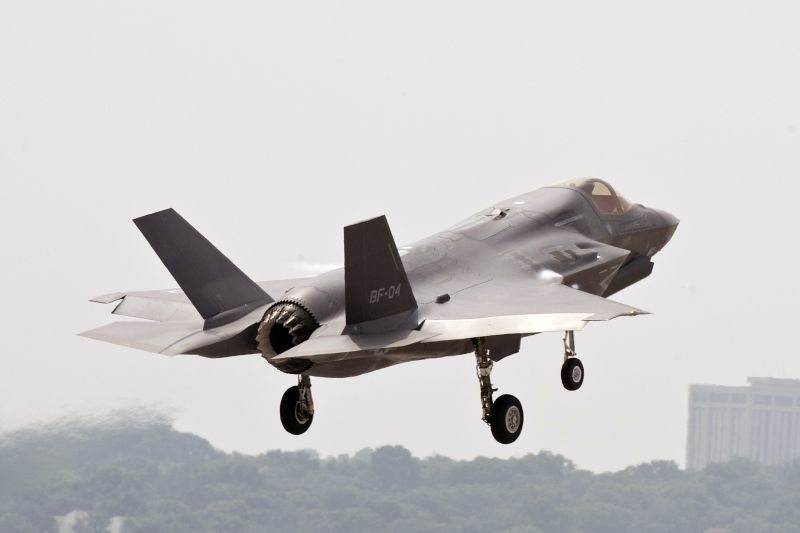It’s the steal of the century: For the price of buying a condo in Washington, DC, you can support the political campaigns of Members of Congress who support your trillion-dollar program. Talk about return on investment!
On November 9, Reps. Kay Granger (R-TX) and Norm Dicks (D-WA) announced the formation of a Congressional Joint Strike Fighter (JSF) Caucus that they are co-chairing. The F-35 Joint Strike Fighter is the most expensive program in Pentagon history, and it has been plagued by delays, cost overruns and defects that have raised eyebrows at the Pentagon and in Congress (the latest official report on JSF problems was made public by POGO yesterday). As of its announcement, the JSF Caucus had 48 Members of the House on its roster.
According to Granger and Dicks’ press release, the Caucus will “provide members of Congress accurate and timely information on the development, testing and deployment of our next-generation fighter.” The announcement quickly dispels any notion of the group’s objectivity, noting that “the Joint Strike Fighter program is an absolute necessity.”
The rhetoric emanating from these Members of Congress shouldn’t be surprising given their ties to the companies benefitting from the billions of taxpayer dollars spent yearly on the JSF.
JSF Contractor Contributions Flow to Members of the JSF Caucus
The primary contractors building the JSF—Lockheed Martin, Northrop Grumman, BAE Systems and Pratt & Whitney—have contributed $326,400 to Members of the JSF Caucus in the first year of the 2012 election cycle, according to a joint analysis of campaign finance data by the Center for Responsive Politics and the Project on Government Oversight (POGO). These firms’ political action committees (PACs), which distribute campaign contributions to promote the contractors’ political goals, gave the average Member of the JSF Caucus $6,094—nearly double what they gave to the average representative not in the caucus ($3,077).
And, it’s not just the corporate PACs that are funneling money to these legislators; individuals working for these firms also disproportionately direct their campaign contributions to these representatives. In fact, thus far in the 2012 election cycle, the average member of the JSF Caucus has received nearly twice as much money ($706) from employees of the top four JSF contractors than the average representative who is not in the JSF Caucus ($387).
Even more telling is that the largest recipients of campaign contributions from JSF contractor PACs and individuals have gone to the co-chairs of the caucus, Granger and Dicks. Dicks has received $29,500 and Granger’s been given $45,700 from the JSF contractors, which, in JSF pricing, might roughly equate to one screw. (That may sound like a bit of an exaggeration, but given overcharges we’ve seen in other contracts, it might not be too far off.)
But, of course, those making campaign contributions or receiving them will never say the political cash “buys” Members of Congress (just as doctors aren’t in the pocket of the pharmaceutical companies whose representatives meet with them). Influence is a subtle force, and campaign contributions are a bit like the old question about the chicken or the egg. Do certain legislators get campaign cash because they support what their political donors like? Or do donations sway their views?
The answer is, in all likelihood, probably both. What is certain, however, is that those in Congress who decide the fate of these billion-dollar programs routinely raise thousands of dollars from—and even invest their own money in—the companies behind these programs. Moreover, since the late 1990s, the proliferation of leadership PACs has strengthened the link between fundraising and positions of power. Speaking of Jerry Lewis’ ascension to chair of the powerful House Appropriations Committee in 2006, American Enterprise Institute congressional scholar Norman Ornstein noted that the choice was made “not solely, or even primarily, on the basis of legislative acumen or leadership skills, nor even by ideology. Rather, the ante to get into the race itself was to raise a ton of money for ‘the team.'”
And lobbyists have been ready to move the invisible hand of congressional power, as Leon Panetta told Robert Kaiser before becoming Secretary of Defense, “The lobbyists go from reception to reception with checks in their breast pockets, handing them out to the potential favor-givers, with the latter fully understanding that the time will come when a favor will be sought.”
JSF Money Flows to JSF Caucus Members’ States
The JSF Caucus has another, perhaps more significant reason to lock in support for the JSF program: its Members’ home states receive a disproportionate share of JSF dollars, and, in turn, jobs for their constituents. In the face of seeing the JSF program cancelled, even the most impassioned supporters of unfettered markets, like JSF Caucus Member Scott Tipton (R-CO), will, without irony, raise the specter of mass layoffs as a defense of the program.
According to Lockheed Martin’s “Domestic Impact” estimates, the JSF has more than 1,000 suppliers spread over all but three states, and the program’s direct economic impact on these states is more than $6 billion annually.
But, this return of taxpayer dollars isn’t dispersed equitably amongst the states; it flows disproportionately to states represented on the JSF Caucus. In fact, more than 92 percent of the JSF’s “Domestic Impact” goes to the 18 states with Members on the JSF Caucus. It’s also telling that 12 representatives on the JSF Caucus, a quarter of all caucus members, hail from Texas—the second largest recipient of JSF money, behind only California.
Lockheed also provides figures for the amount of indirect monetary impact the JSF program creates in different states. But there have been questions about how Lockheed calculates both these and the direct impact amounts, with some evidence that their estimates have been overblown. Specifically, as journalist David Axe has pointed out, Lockheed arrived at its inflated figure of more than 95,000 American jobs being lost if F-22 production ended by making the erroneous assumption that all employees at F-22 subcontractors, many of which work on a variety of other projects, were working on the F-22.
Furthermore, it’s clear that lots of taxpayer money is being spent on the JSF and that JSF contractors have used the jobs argument as one of the main reasons to keep the money flowing for it. But some economists have found that defense spending is a poor way to create jobs compared to other types of government stimulus, be it spending on education or clean energy or tax cuts.
The JSF Caucus Members are right to say that the JSF is important because it is intended to fulfill a key void in the military’s arsenal, and represents billions of dollars in expenditures each year. But given the current fiscal climate, now more than ever legislators need to act in the national interest—not for parochial reasons.











